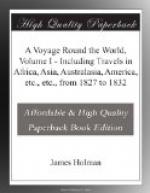Dr. Dix, the surgeon of the Cyane, became the earliest victim of a too generous zeal for the advancement of the colony. The tears of gratitude fell upon his grave, which was closed over his remains by the hands of a sorrowing community. The case of the amiable Seton is still more worthy of memorial, in him the blossoms of youth had just ripened into the graceful bloom of manhood, giving to a person naturally prepossessing, the higher ornament of a benevolent disposition, and accomplished mind. He perceived that his services would be invaluable to the colony, and he became the voluntary companion of the solitary Agent. His conciliating manners, and judicious counsels, completed the conquest of public approbation, and rendered his decease (which took place on board the Oswego, five days after he had re-embarked for the United States), a subject of unmitigated grief to the whole colony.
The arrival of the above-mentioned vessel, bringing an accession of sixty-six emigrants from the middle states of America, with ample stores and a physician, terminated the difficulties of the colonists, and since that period, the settlement has continued rapidly improving in all those resources necessary to the comforts of peace; as well as in those means of defence which serve, at once, to repel, and even defy the incursions of war.
From this period the affairs of the colony have rapidly improved. In a short time after peace was restored, sixty-one new emigrants, and a supply of stores, under the charge of Dr. Ayres, augmented the resources of the colonists; but that gentleman was obliged, in consequence of the state of his health, to resign, at the close of 1823, the superintendance of the interests of the colony to Mr. Ashmun, who continued, until the period of his death, to act as principal Colonial Agent to the Society. To Mr. Ashmun’s admirable management of the affairs of the colony, much of its contentment and security may be attributed. He purchased from its natural owners, all the territory he occupied; and as not an acre was taken without an equivalent, the natives were well pleased to cultivate an intercourse that was at once so profitable and desirable. In 1825, a number of fresh emigrants arrived, whose pursuits were of an agricultural nature, and as they desired to go into the jungle at once, and commence operations, a negotiation was opened with the neighbouring tribes for the purchase of land. The ground selected was a tract of about twenty miles, varying from one to three miles in breadth, lying on the navigable part of the St. Paul’s river. The advantages of this accession of territory, consisted in the opportunity it afforded the settlers of dwelling on their plantations, instead of being compelled to live in the town, at an inconvenient distance from them; in the fertility of the soil, which was sufficiently rich to enable the emigrant to support himself and his family, a short time after his arrival; in making the agricultural




